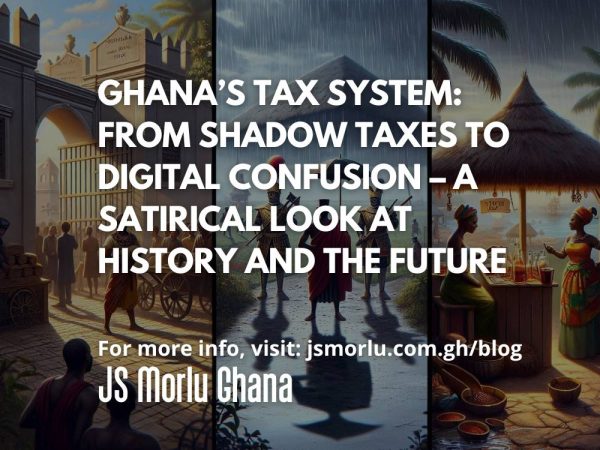By: Emmanuel Dartey Sogah

Introduction: Taxing Shadows, Rain, and Laughter – Welcome to Medieval Ghana
If you think today’s taxes are outrageous, wait until you hear about medieval Ghana‘s taxation system. Long before colonial rule, kings and chiefs had a unique approach to generating revenue—by taxing everything imaginable.
Ever walked into a royal courtyard in medieval Ghana? Oops. That’ll cost you. If your shadow touched the ground in the king’s palace, you had to pay a shadow tax—because, obviously, your shadow was trespassing on royal land. If you dared to argue, you risked a fine, forced labor, or—if you were really unlucky—having your shadow “permanently confiscated” (also known as exile).
And it didn’t stop there. Here are just a few of the bizarre taxes people faced back in the day:
- The Rain Tax – If rain fell on your farm, it was considered a gift from the gods, and the king wanted his cut.
- The Palm Wine Tax – If you tapped a palm tree for wine, you weren’t just enjoying a drink—you were stealing from nature (and the king’s potential business).
- The Market Laughter Tax – If you laughed too loudly in the market, it was seen as disrupting business. Your punishment? A fine—or worse, free labor for the local chief.
- The Fisherman’s “Luck Tax” – If you caught too many fish, you had to pay extra, because clearly, the gods had favored you and the chief deserved a share.
Fun Fact:
Kings and chiefs in medieval Ghana didn’t just tax people—they also taxed spirits! If a village believed an ancestor’s ghost was haunting someone, the family had to pay the chief to perform a “spirit removal tax.” No payment? The spirit stays.
Fast forward to today, and while we no longer pay taxes for shadows or spirits, modern taxation still feels like an ongoing experiment in financial suffering.

From Medieval Madness to Modern Confusion: Ghana’s Tax Evolution
Ghana’s tax system has changed a lot since the days of shadow taxes, but not always for the better. While ancient Ghanaian rulers taxed anything that moved (or didn’t move), today’s government has its own creative ways of emptying our wallets (Momo Tax).
🚀 Then: Step into a king’s palace? Pay the Shadow Tax.
💰 Now: Receive money on your phone? Pay E-Levy.
🚀 Then: Laugh too loudly in the market? Pay the Market Laughter Tax.
💰 Now: Sell too many goods online? The Digital Tax is coming for you.
🚀 Then: Catch too many fish? Pay the Fisherman’s Luck Tax.
💰 Now: Work too hard and earn more? Pay Progressive Income Tax (the more you earn, the more they take!).
Ghana’s current tax system is meant to drive development, but in reality, it feels like an endless game of dodgeball—except the taxman never misses.

The Informal Sector: The Tax Collector’s Worst Nightmare
One major challenge today is Ghana’s huge informal sector, which accounts for 80% of the workforce. Unlike medieval times, where kings had warriors and spiritual enforcers to demand taxes, today’s government has to rely on goodwill, threats, and the occasional tax amnesty.
Imagine being a tax collector sent to a busy market in Accra:
📌 Tax Collector: “Madam, you need to pay tax on your fried plantain business.”
🍌 Market Woman: “Did the government fry the plantains for me?”
📌 Tax Collector: “No, but…”
🍌 Market Woman: “Then please, take your clipboard elsewhere.”
This is why the government prefers indirect taxes—like fuel levies, import duties, and VAT—so people pay taxes without realizing it. But when new taxes keep popping up like weeds after rainfall, frustration builds.

Ghana’s “Creative” Tax Dodging Strategies
Since the dawn of taxation, people have tried to avoid paying—and Ghanaians are masters of the art. Here are some of the most ingenious ways people dodge taxes today:
✅ The “I’m Not Here” Strategy – When tax officials visit, businesses mysteriously close for the day.
✅ The “Cash-Only” Method – No digital transactions = No electronic trail = No tax!
✅ The “Underreport Everything” Trick – Earn GH¢50,000? Tell the taxman you earned GH¢5,000. Works every time!
✅ The “Religious Loophole” – Register your business as a church or shrine, and suddenly, you’re tax-exempt!
Fun Fact:
In 2018, the Ghana Revenue Authority clamped a luxury Rolls Royce over unpaid taxes. The car sat there, embarrassed, in public view until the owner paid up. Moral of the story? If you drive a luxury car in Ghana, be ready to explain how you got it.

What’s Next? The Future of Taxation in Ghana
With a new government coming in, people are wondering: Will taxation improve, or will we just invent new ways to suffer? Here are some possible future taxes to watch out for:
💡 “Breathing Tax” – You inhale public air? That’s state property. Pay your share.
💡 “Social Media Tax” – Every time you post online, you contribute to “public discourse.” Expect a bill soon.
💡 “Rain Tax 2.0” – If rain touches your rooftop, you’re technically “harvesting state water.” Pay up!
💡 “Sunlight Tax” – If you hang your clothes outside to dry, you’re using solar energy without a permit. Prepare for a fine.
While these may sound ridiculous, so did the E-Levy at one point—and look where we are now!
Final Thought: Would You Survive a Medieval Ghana Tax System?
If you lived in ancient Ghana, how much would you owe?
🔥 Walked in the king’s courtyard? Shadow Tax!
🌧️ Stood in the rain? Rainfall Tax!
🍷 Tapped palm wine? Happiness Tax!
😂 Laughed too loudly? Noise Pollution Tax!
Today, we may not have shadow taxes, but we still face an endless wave of new levies, rising VAT, and questionable policies. The key question remains: Will Ghana finally fix its tax system, or will the government continue to “innovate” new ways to take our money? Until then, watch where your shadow falls—history has a funny way of repeating itself!
What Do You Think?
Do Ghana’s modern taxes make more sense than medieval ones? Or do they just feel like an updated version of the old tricks? Share your thoughts! 🚀

Author: Emmanuel Sogah – Expert in Financial Technology, Operations & Market Strategy
As a senior member of JS Morlu Ghana Limited, Emmanuel Sogah is a key member of the FinovatePro (www.finovatepro.com), Fixaars (www.fixaars.com) and Recksoft (www.recksoft.com) development teams, where he provides data-driven marketing insights that fuel strategic growth and innovation. With a strong background in accounting and finance, he possesses deep expertise in the economic, financial, and regulatory landscape of Ghana and Africa, ensuring that our solutions align with evolving business and market needs.
His ability to analyze financial ecosystems and translate insights into actionable strategies makes him a valuable asset in driving financial innovation and market expansion. By bridging financial technology, market trends, and enterprise solutions, Emmanuel helps shape scalable, cutting-edge products. For inquiries or collaborations, he can be reached at sogah.emmanuel@jsmorlu.com or +233 244 197 841.
